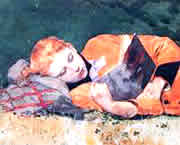
 |
|||||||||||||
Good
books |
|||||||||||||
| |
Good
books to start with |
  . .I've spent way lots of money on dozens and dozens of books about ancient religion. If I were starting over, these are the three I'd buy first: |
| Deconstructing
Jesus by Robert Price Professor of Biblical Criticism at the Center for Inquiry Institute, member of the Jesus Seminar, and editor of the Journal of Higher Criticism |
The best book to get started with, because as an academic himself Price understands the orthodox scholarly theories, though he doesn't buy them. The theme is that nothing we know about Jesus is historical, everything is mythical. The book follows the regulation scholarship, starting with the "Jesus People," (an academic term for Jesus' first followers; the Jesus People weren't really Christians, since they didn't believe Jesus was God or that he had risen from the dead), on to the first groups who worshiped Jesus as God, the Christ-cults (another academic term), though Jewish Messianic expectations, non-orthodox early Christianities and even ancient novels, which reveal a cultural theme of escape from crucifixion. The point is not one-for-one parallels between Jesus and, say, Mithras or Osiris. The point is that the first Christians took the basic ideas of their culture and adapted them to their new faith. Wow. |
| Backgrounds
of Early Christianity by Everett Ferguson
|
An
excellent book to start with. If you need a special-purpose book to understand Christianity's Pagan origins, then probably Christianity didn't have Pagan origins. It does; you don't. What you really need is a good book describing ancient Pagan culture and religion. This outstanding, easy to read book is the best I've read. From Greco-Roman religions (Mithras, Isis, Dionysus, Eleusis, the mystery religions, etc.) and philosophies (monotheism, the soul, life after death, etc.), on through an excellent section on Second Temple Judaism and another on early Christianity, you'll discover the facts and issues behind modern scholarship on Christian origins. I bought this book on a whim, figuring it would have a relevant section or two; I ended up reading the thing cover to cover, 600 delightfully clear and well written pages. But you don't have to read it cover to cover -- just pick the section you're interested in.
|